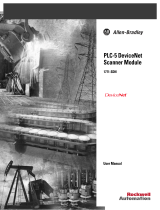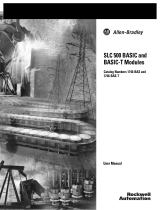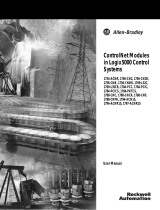
ii
1784-6.5.22 - Novmber 1999
Chapter 3
Install the Card Inside the Computer
Before You Begin . . . . . . . . . . . . . . . . . . . . . . . . . . . . . . . . . . . . . . . . 3-1
The KTx Skirt Area . . . . . . . . . . . . . . . . . . . . . . . . . . . . . . . . . . . . . . . 3-2
Access the Computer’s Expansion Slots . . . . . . . . . . . . . . . . . . . . . . 3-3
E3 Jumper Sets Operating Mode . . . . . . . . . . . . . . . . . . . . . . . . . . . . . 3-4
Insert the Card . . . . . . . . . . . . . . . . . . . . . . . . . . . . . . . . . . . . . . . . . . . 3-5
What to Do Next . . . . . . . . . . . . . . . . . . . . . . . . . . . . . . . . . . . . . . . . . 3-5
Chapter 4
Connect the Interface Card
1784-KTX Connections . . . . . . . . . . . . . . . . . . . . . . . . . . . . . . . . . . . 4-1
1784-KTS Connections . . . . . . . . . . . . . . . . . . . . . . . . . . . . . . . . . . . . 4-2
1784-KTXD Connections . . . . . . . . . . . . . . . . . . . . . . . . . . . . . . . . . . 4-2
Before You Begin . . . . . . . . . . . . . . . . . . . . . . . . . . . . . . . . . . . . . . . . 4-3
Connect the 1784-KTx Card to DH+ Devices . . . . . . . . . . . . . . . . . . 4-4
Connect the Card to a Classic PLC-5 Processor . . . . . . . . . . . . . . . . . 4-4
Connect the Card to an Enhanced PLC-5 Processor . . . . . . . . . . . . . . 4-6
Terminate the Last Node. . . . . . . . . . . . . . . . . . . . . . . . . . . . . . . . 4-7
Connect the Card to a Data Highway Plus Network . . . . . . . . . . . . . . 4-7
Evaluate 1784-KTx Card Connection Options . . . . . . . . . . . . . . . . . . 4-7
Connect the Card via a DH-485 Network . . . . . . . . . . . . . . . . . . . . . . 4-8
Connect the Card to an SLC 500 Processor. . . . . . . . . . . . . . . . . . . . . 4-9
Terminate the Last Node. . . . . . . . . . . . . . . . . . . . . . . . . . . . . . . 4-10
What to Do Next . . . . . . . . . . . . . . . . . . . . . . . . . . . . . . . . . . . . . . . . 4-10
Appendix A
Run the 1784-KTx Card Diagnostics for Windows NT
Install the Diagnostics . . . . . . . . . . . . . . . . . . . . . . . . . . . . . . . . . . . . . A-2
Run the 1784-KTx Diagnostics for Windows NT. . . . . . . . . . . . . . . A-12
When Do I Run Diagnostics? . . . . . . . . . . . . . . . . . . . . . . . . . . . A-12
Troubleshooting the KTx Card . . . . . . . . . . . . . . . . . . . . . . . . . A-12
Error Message . . . . . . . . . . . . . . . . . . . . . . . . . . . . . . . . . . . . . . . . . . A-17
No KTx cards are detected . . . . . . . . . . . . . . . . . . . . . . . . . . . . . A-17
View the readme.txt file. . . . . . . . . . . . . . . . . . . . . . . . . . . . . . . . . . . A-18
Remove the Card’s Diagnostics in Windows NT . . . . . . . . . . . . . . . A-19

























